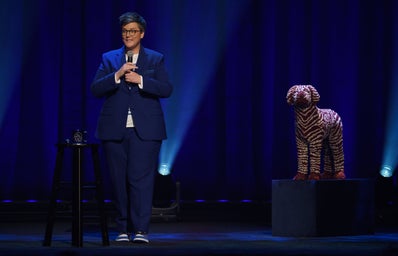“Satire allows you to say almost anything. That’s where truth is spoken to power in our society. When you sugar-coat a bitter truth with humor, it makes the medicine go down. Your audience lets its guard down.” – Malcolm Gladwell
Loadsamoney was a character that took the United Kingdom by storm in the 1980s. Taking a dig at Margaret Thatcher’s politics and the “loads of money” mentality, Harry Enfield’s invention became a sensation in the world of satire. It even had a theme song that made it to number 2 on the British pop charts, and now has over 3 million views on YouTube! That’s a reach no political book, op-ed, documentary could challenge. Especially given our diminishing attention spans.
The 21st century has seen its fair share of advancements in the world of geopolitics. However, it’s one baneful consequence has been the active polarisation taking place across political spectrums, skilfully accelerated by the internet age. While people are more connected than ever, the quality of communication and information has suffered greatly. The reason I bring this up is because humans are now, more than ever, interacting with people with political and cultural backgrounds that differ vastly from their own. And one of the instrumental ways to actually speak truth to power has been through levity, almost as much as it is via serious discourse.
Humour has been an important aspect of conversations at the collision of society and polity – and satire has been a significant tool in keeping up with the nitty gritty of the news world, pop culture, and our lives altogether. And while it is an extension of free speech in most democracies, the reception of satire has often been misguided. I say most, because of the growing intolerance among the powers running these ‘democracies’.
While in the United States, there exist primetime television programs such as The Daily Show, Saturday Night Live, and of course Last Week Tonight with John Oliver – they all seem to be losing the very essence behind such shows. Naturally, it doesn’t translate well for those watching. To embellish is to belittle in this case, for characters, comedians, and actors have grown bigger than the intent of satire itself. This has been one of the adverse consequences of adding humor and irony to amplify voices or to address geopolitics.
When we narrow this approach in India however, we find very few solid examples. At least not ones performed at par with the tastelessness that loadsamoney did. Comedians and political satire in India have been repeatedly seen as a threat to those in power – be it at the central or state level. And as I spoke about the Cost of Free Speech about a year ago, the same kind of levity does not thrive given the irrational restrictions on criticism and dissent.
The dispersion of spaces that resonate with these strong voices in India remains scarce and limited. Be it a cartoonist for newspapers, sketch comedies, or animated portrayals of public figures – they all seem to be dwindling. Hasya Kavita (light poetry) in regional languages, once a monumental force in the world of Indian political discourse, has also lost its reach in the last decade. And as we can see, the ones that remain standing are heavily regulated or censored – thereby dampening the very unique prowess or courage that satire possesses.
An important question, as you can tell from the title, has always been about how these instances, characters, and sensationalized programs are perceived by the audiences. And do they really deliver on what they set out to do. When we go back to Enfield’s creation in Thatcher’s Britain – in his own view, it made absolutely no difference in the way people saw her politics or the scale of capitalism she had engendered in their nation.
Over the years, various surveys have revealed that irony-laced sketches, poems, and talk shows simply pander to people’s motivated cognition or biased perceptions: those targeted simply choose to ignore the mockery and revel in the fame it brings them, while those on the other end feel satisfied at ridiculing a certain community, group, or political ideology.
Similarly for India, and many other developing countries, the narrative control within the world of humor continues to be an obstacle in really making a difference. While it gives people and movements a sense of power and liberty when speaking about pertinent issues, it doesn’t make it easier to get a point across to the other side. And in a world where a new ‘other’ side is born every day, and when we are constantly divided with rampant bigotry and xenophobia, the priority has to be effective communication.
So, does satire work? Yes and no. To an extent, it fails to achieve certain ideals we might expect from it, but it continues to be a powerful medium of the people, so long as it remains outspoken, popularised, and doesn’t lose its loadsamoney factor.
This article is has borrowed themes from a Revisionist History Podcast – The Satire Paradox


